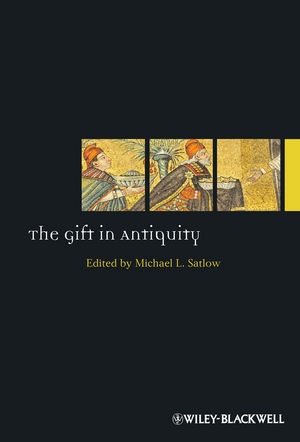Read more
Informationen zum Autor ABOUT THE EDITOR Michael L. Satlow is Professor of Religious Studies and Judaic Studies at Brown University. He is a co-editor of Religion and the Self in Antiquity (2005) and the author of Creating Judaism: History, Tradition, Practice (2006); Jewish Marriage in Antiquity (2001); Tasting the Dish: Rabbinic Rhetorics of Sexuality (1995), and numerous essays on Jews and Judaism in antiquity. Klappentext " The Gift in Antiquity is an exciting and learned dialogue with Marcel Mauss's The Gift: Forms and Functions of Exchange in Archaic Societies, published ninety years ago. The essays engage Mauss's model, offering critique and nuance, and sometimes push Mauss's insights far beyond what he had imagined. While many anthologies are useful for the one or two essays they contain, this volume offers a tightly organized collection useful as a reader in classics, religion, or anthropology courses." John S. Kloppenborg, University of Toronto " The Gift in Antiquity offers a rousing demonstration of the lessons to be learned from Marcel Mauss's early insight that gift-giving offers a privileged way to understand social relations and social obligations. The book brims with the excitement of scholars from different disciplines building on a common theoretical tool to offer new perspectives on topics in their own fields as well as on the foundational concept of the gift itself. It is a book that all scholars of the ancient Mediterranean and Near East, as well as all scholars interested in the gift, will want to read." David I. Kertzer, Brown University In his seminal essay The Gift (1922), French sociologist Marcel Mauss proposed an original theoretical framework for thinking about gift-giving practices. Emphasizing that all gifts were "total social facts" that created bonds of reciprocity between communities and individuals, Mauss's framework has been fundamental in anthropological research. The Gift in Antiquity applies Mauss's notion of gift-giving as a catalyst in strengthening group bonds to the study of antiquity. This thought-provoking collection of 14 original essays covers such wide-ranging topics as vows in the Hebrew Bible; ancient Greek wedding gifts; Hellenistic civic practices; Latin literature; Roman and Jewish burial practices; and Jewish and Christian religious gifts, along with wider theoretical and methodological reflections. Collectively, the essays open up a cross-cultural dialogue that generates new ways of thinking about both antiquity and theories of gift-giving and reciprocity. The Gift in Antiquity offers illuminating insights into the enduring value of Mauss's work and the influential nature of reciprocity and exchange throughout the course of history. Zusammenfassung The Gift in Antiquity presents a collection of 14 original essays that apply French sociologist Marcel Mauss s notion of gift-giving to the study of antiquity. Inhaltsverzeichnis Notes on Contributors vii Series Editor's Preface x Preface xii 1 Introduction 1 Michael L. Satlow 2 Ceremonial Gift-Giving: The Lessons of Anthropology from Mauss and Beyond 12 Marcel Hénaff 3 Alms, Blessings, Offerings: The Repertoire of Christian Gifts in Early Byzantium 25 Daniel F. Caner 4 Gift-Giving and Power Relationships in Greek Social Praxis and Public Discourse 45 Marc Domingo Gygax 5 Fictive Giftship and Fictive Friendship in Greco-Roman Society 61 Zeba Crook 6 Ovid Negotiates with His Mistress: Roman Reciprocity from Public to Private 77 Neil Coffee 7 "Can't Buy Me Love": The Economy of Gifts in Amorous Relations 96 David Konstan 8 Without Patronage: Fetishization, Representation, and the Circulation of Gift-Texts in the Late Roman Republic 1...

